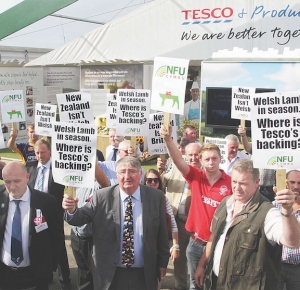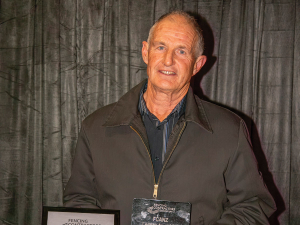About 60 farmers protested at Tesco’s stand at the Royal Welsh Show (July 21-24), accusing the retailer of selling New Zealand lamb at the height of the British season despite its claims that it supported UK farmers.
The National Farmers Union is unhappy with Tesco’s decision to heavily promote end-of-season lamb from the southern hemisphere despite it being the middle of the prime season for British grass-fed, spring-born lamb.
UK media report Tesco selling two 300g packs of New Zealand lamb chops for £6 – a saving of 30%. New Zealand leg steaks were also on offer at £4 for a 270g pack usually priced at two steaks for £7 or three for £10. Only premium British lamb was on sale.
A Tesco spokesman says the supermarket plans a half-price promotion of British lamb soon, but could not say when.
“We sell more British lamb than any other retailer, and we are proud to sell and promote British lamb to our millions of customers.
“We know it is a great product and we want to sell large volumes at the peak of its season.”
NFU livestock board chairman Charles Sercombe, who took part in the protest, says livestock farmers are angry and frustrated with some retailers.
“Some are promoting an end-of-season product many view as inferior, over Red Tractor-assured, fresh lamb produced in the fields, valleys and hills of England and Wales.
“We’re highlighting Tesco for failing on commitments by their outgoing chief executive Philip Clarke at the NFU conference last year that Tesco should be the best supporter of British farmers and that it wished to shorten the supply chain. We will keep the pressure on all retailers. The independent Beef & Lamb Watch results just out highlight those retailers who aren’t backing British farming.”
UK farmers export 100,000t of lamb a year – 33% of their production – mostly to Europe where it is seen as a premium product. Yet retailers import 100,000 tons, mostly from New Zealand.
NFU president Meurig Raymond says the UK was self-sufficient in lamb last year and lamb numbers are higher this year.
“Promoting New Zealand lamb over British, and Tesco’s attempts to justify this, misleads consumers about the seasonality of lamb and sends a signal to farmers that Tesco is not prepared to promote the benefits of food produced in the UK.”
He says clearly-labelled home-grown lamb should get pride of place in retail outlets, so consumers can easily find it.

















